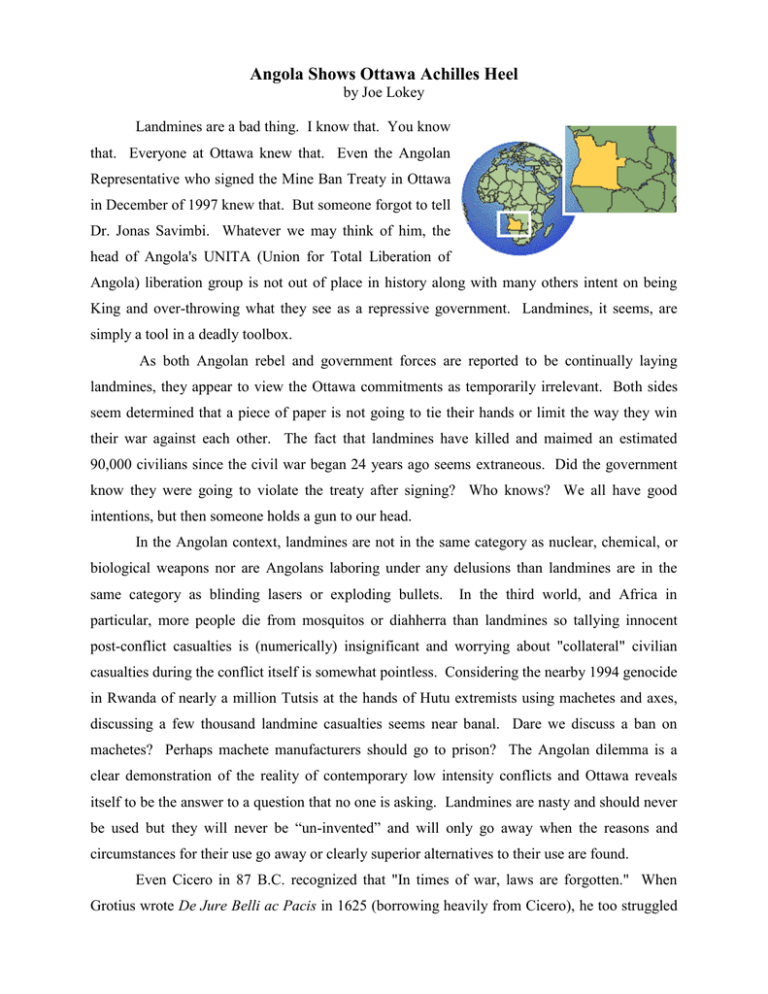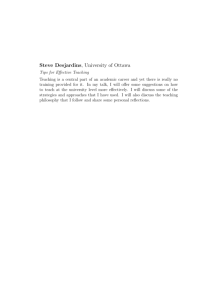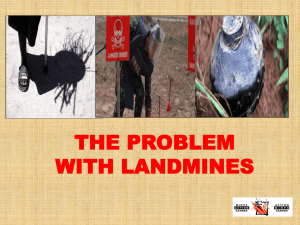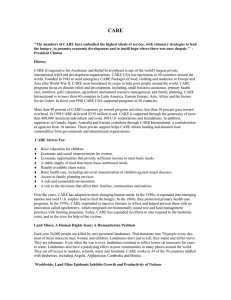Angola Shows Ottawa Achilles Heel
advertisement

Angola Shows Ottawa Achilles Heel by Joe Lokey Landmines are a bad thing. I know that. You know that. Everyone at Ottawa knew that. Even the Angolan Representative who signed the Mine Ban Treaty in Ottawa in December of 1997 knew that. But someone forgot to tell Dr. Jonas Savimbi. Whatever we may think of him, the head of Angola's UNITA (Union for Total Liberation of Angola) liberation group is not out of place in history along with many others intent on being King and over-throwing what they see as a repressive government. Landmines, it seems, are simply a tool in a deadly toolbox. As both Angolan rebel and government forces are reported to be continually laying landmines, they appear to view the Ottawa commitments as temporarily irrelevant. Both sides seem determined that a piece of paper is not going to tie their hands or limit the way they win their war against each other. The fact that landmines have killed and maimed an estimated 90,000 civilians since the civil war began 24 years ago seems extraneous. Did the government know they were going to violate the treaty after signing? Who knows? We all have good intentions, but then someone holds a gun to our head. In the Angolan context, landmines are not in the same category as nuclear, chemical, or biological weapons nor are Angolans laboring under any delusions than landmines are in the same category as blinding lasers or exploding bullets. In the third world, and Africa in particular, more people die from mosquitos or diahherra than landmines so tallying innocent post-conflict casualties is (numerically) insignificant and worrying about "collateral" civilian casualties during the conflict itself is somewhat pointless. Considering the nearby 1994 genocide in Rwanda of nearly a million Tutsis at the hands of Hutu extremists using machetes and axes, discussing a few thousand landmine casualties seems near banal. Dare we discuss a ban on machetes? Perhaps machete manufacturers should go to prison? The Angolan dilemma is a clear demonstration of the reality of contemporary low intensity conflicts and Ottawa reveals itself to be the answer to a question that no one is asking. Landmines are nasty and should never be used but they will never be “un-invented” and will only go away when the reasons and circumstances for their use go away or clearly superior alternatives to their use are found. Even Cicero in 87 B.C. recognized that "In times of war, laws are forgotten." When Grotius wrote De Jure Belli ac Pacis in 1625 (borrowing heavily from Cicero), he too struggled with the competing concepts of jus ad bellum (those circumstances which justified state belligerency) and jus in bello or rules of proper conduct in hostilities. To ignore the nature of war and conflict while discussing Ottawa is to ignore the nature of infection while designing medicines. This is where Ottawa fails. This is why Ottawa is unenforceable. This is why Ottawa, if not modified, will soon be relegated to the shelves of countless other inconsequential accords. Angola is a clear and unambiguous example of the key weakness in the Ottawa agreement. During the development of the Treaty, its writers lacked any recognition of human history, the nature of critical ingredients to enduring international security agreements, causes and responses to internal insurgencies, effective coordination with other agreements, and, as a result of these omissions, failed to demonstrate any intellectually sound basis for implementation. In short, Ottawa lacks a simple dose of reality. Professional soldiers have long had their codes of conduct forged in the atrocities of yesterday's Hitlers and Stalins and follow rules of war designed to minimize civilian casualties and indiscriminate human carnage. Most of today’s developing world combatants, in sharp contrast, are rarely professional soldiers, are usually thugs and mercenaries, conscripted and uneducated, and follow no rules other than winning at any cost. Will the first meeting of States Parties gathering in Maputo on May 5 who ratified the Ottawa Accord have the courage to address this issue or will they be content to result to their predictable moral platitudes and spout more ascerbic righteous indignation at non-signatory states? Though there will be many in Maputo whose only skill is telling others how they should think and behave, there will likely be no one with any experience in modern insurgent warfare or familiar with the nature of low intensity conflict so the outcome is fairly predictable. Reality will be conspicuous by its absence. If a workable response to the Angolan paradox fails to emerge from Maputo, it will become the precedent for future abdication by every other signatory rendering the hard work of thousands as a moot and pointless exercise. No one who understands Angola is too surprised by any of this. After signing the Bicesse Accords in 1991 and then declaring the ensuing election a fraud that put the former Soviet-backed MPLA in power, Mr. Savimbi has continued to put his personal political agenda and quest for control of Angola's diamond wealth and other bountiful resources ahead of the best interest of peace and the well-being of the Angolan people. The Lusaka Agreement, signed in 1994 has all but been abandoned. Angola is a mess. Angola is not unique. In fact, it is all too much the norm. 2 Only 41% of Angolans have access to safe water. About 30% have access to primary health care and that is now on the high side with roads becoming impassable. Only about 3% of the government budget was allocated for health care in the first place. There were an estimated 400,000 refugees in neighboring countries but that has also undoubtedly increased in the last six months. Delivering aid to the 11 million people of Angola would be a daunting task even without the conflict and without the landmines. Angola is a vast country, about twice the size of Texas, and even though the combat is scattered throughout, it is creating an ebb and flow of refugees and IDPs, estimated at 1.2 million, with each battle as Angolans try to escape hostilities. In the last half of 1998 in Moxico Province, Medico International reported that 66 people were killed or maimed in one of the highest concentrations of incidents recorded since 1994. The primary reason was civilians transiting formerly safe areas that had been remined by Government forces reinforcing the defensive perimeter around Luena. Even marking the minefield was forbidden. Mines are being laid on artery roads by UNITA to stop MONUA, FAA/Police and commercial transports. They did, indeed, hit 40 soldiers killing 12 of them but also killed four civilians shortly thereafter along the same road. None of these people care what happened in Ottawa. It has made no difference to them. It did nothing to prevent their injury or death and it will do nothing to clear the mines in the ground today. In short, those spilling champagne in Ottawa while they signed the treaty knew nothing of war and therein lies the Achilles heel of the Ottawa Treaty. The actual "do something" facet of Ottawa is it's theoretical demining premise in which it alleges to "clear" mines not yet produced or laid by preventing, through a ban, their production, stockpiling or use. On the surface, this would seem a reasonable objective and a "long view" to ensure that non-existent mines will no longer plague our children's children. To be certain, common use has been changing though few who have studied this, except the ICBL ideologues desperate to claim success, seriously attribute this to Ottawa since the trends began years before the ICBL even existed. Manufacturers have been decreasing long before the treaty due to a drastic reduction in demand by the world's militaries since the end of the Cold War. Stocks have also been decreasing for decades due to the increased cost of maintenance and storage of dated munitions. Finally, in spite of wildly baseless and irresponsible conjecture to the contrary, widespread use of APL globally has been drastically reduced due to the lack of any large-scale military operations since Desert Storm. The Serbian mines in Kosovo along the Albanian border are a notable exception. 3 The premise of the Ottawa convention, however, was based on the perceived use and employment of landmines in contemporary, large scale, modern military activities during warfare between nation states. Where Ottawa fails, and is so vividly demonstrated in Angola, is that it, in no way, recognizes the world today and changed nature of warfare and internal conflicts. There are no "armies" to regulate with the worse offenders being non-state actors. There are no "countries" to punish with the predominant use coming from rebel groups, mercenaries, drug cartels, insurgents, or weak and unstable central governments. We can’t stop North Korea from manufacturing drugs or nuclear weapons so how do we stop them from exporting landmines? The Angolan government, even while recognizing the benefits of a minefree world, also recognizes that mines are an integral part of a bigger security equation for smaller nations that shortsighted, myopic humanitarians are incapable of seeing. Angolans on both sides see their survival threatened and landmines as part of the solution since none of the self-righteous wealthier countries are sending their troops to assist or to replace the defensive capabilities landmines give them. The Norwegian People's Aid is clearing mines in Angola and has recently needed to clear old defensive minefields around Malanje to make space for refugee camps. They have appealed for both sides to quit laying mines and have, on their web site, called on the international community to consider sanctions against Angola for violating their Ottawa commitments. This request is out of frustration for realistic and plausible answers because even they must recognize the futility of imposing unobtainable sanctions on a war-torn nation. Therein lies the absurd reality of Ottawa as it does little but pontificates moral righteousness without realistic or logical alternatives to conflict resolution. Coupled with no enforcement provisions, this makes the treaty another potentially useless piece of paper to be debated by academics, diplomats, and professional advocates living in their own separate reality. They all too frequently lament the horrors of war at their banquet tables but are woefully unable and unwilling to get their hands dirty with it's bloody consequences. The German charity mine clearance group People Against Landmines (MgM) is clearing high pressure, key transport routes to enable the flow of refugees through suspected mined areas. The Director of MgM, Hendrik Ehlers, said that "We are finding good conditions for our work in emergency situations. Our work in Angola was never as necessary as it is today but, unfortunately, some donors don't understand that if you sanction the government, you are only hurting the people as in Iraq." The clearest demonstration that Ottawa is more smoke and shadows than substance is that there is no compelling provision in the treaty to clear mines. 4 While it laughingly demands war-devastated countries somehow materialize the resources to clear their own mines after signing the treaty, it makes no commitment or provision for acquiring the resources to do so. Article 5 (Destruction of Mines) simply says they will do it in ten years and then request permission to take longer. What happens if permission is denied? On what basis? What outside body is going to determine another nation’s spending priorities? In Mexico City recently, a Colombian military officer said he wanted his mines cleared too but his country can't afford to clear them. "If you want them cleared, you clear them." In frustration, clearance groups observe that donors seem anxious to fund endless ICBL conferences and meetings but the funding into clearing mines, especially in countries like Angola has not been forthcoming as has been highlighted in Newsweek and several other publications recently. Again, the Angola situation demonstrates that Ottawa emphasizes ideals but ignores the realties and needs of real people shedding real blood on the ground. Clearance and victim assistance are an afterthought in the Ottawa construct and must be emphasized more if meaningful progress is to be made. If we believe Article 6 (International Cooperation and Assistance) is going to “force” countries to “contribute” then we may be delusional here as well. Aid and charity can never be compelled by treaty or any other mechanism or it’s not aid or charity and the compelling mechanism is simply international banditry and extortion. If there is any lesson that Ottawa teaches it is that moral imperatives always create logical inconsistencies. As an example of the weak and inconsistent logic surrounding the treaty, Ottawa ideologues denounce landmines as having no military utility. They do this most often by misquoting aged retired general officers who had little or nothing to do with ground warfare doctrine while on active duty. The problem is in reconciling that view with the estimated 70 million in the ground today, the hundreds of millions used in the past, the tens of millions in military stocks, and their continued use in conflict. No utility? (I’ll save the debate here for a future article) Is military utility really relevant to a farmer using them to protect his family? It may not be military but they do have utility. If this is an abhorrent weapon then let’s provide him an alternative. We cannot dismiss something as having “no utility” when hundreds of millions are scattered about clearly having had a “use” to those who laid them. If they are “unacceptable,” then what do we tell him is “acceptable?” There is, however, little doubt that landmine use presents an unacceptable obstacle to economic reconstruction in Angola impeding resettlement, rehabilitation, and reconstitution of Angola's agricultural production capacities. But the lessons of landmine utility (real or imagined) in Angola will apply to other countries as well. Whether they signed or not, any 5 government responsible for the security of its people will use any means available to ensure their security and survival. And in a world of tyrants and dictators, freedom fighters will continue to use cheap, simple and effective weapons, like landmines, to win against stronger and more technologically sophisticated governments they view as the oppressors. “Stigmatizing” a landmine user or labeling them as "criminals" is somewhat of a cruel hoax. No one really knows what “stigmatize” really means or what it entails. We, as a global community, can't even seem to get two lousy Libyan terrorists before a court, we can't bring Slobodan Milosovic to account for the slaughter of hundreds of thousands of Bosnians, and we can't even seem to find Osama Bin Laden. We have “stigmatized” the military regime in Myanmar (Burma) and other places with no effect. Those who are suggesting that a Tamil separatist will somehow be dragged in chains before the World Court at no small cost for using a mine against the Sri Lankan army need to reexamine their priorities. How do we “prosecute” a Khmer Rouge army that laid millions but no longer exists? Do we form Nuremburg-like courts that will hunt landmine users like Nazi war criminals for generations? Some would say “yes” which is why this is not funnier than it would otherwise be. Telling a government what it can or can't do in its own self-defense of its people is not only arrogant but counterproductive when it comes from rich countries with more technology and power, i.e., more alternatives to landmines. It is also often racial and neocolonialist as white governments are perceived as (once again) telling developing worlds that their moral standards are corrupt and “we know what’s good for you even if you don’t.” If Ottawa is to mean anything, it will have to be modified to present viable alternatives that provide an equivalent level of peace and security. Just saying "no" is not good enough. Countries who have been the most vocal in demanding users be labeled "outlaws" should, if they are sincere, volunteer their own soldiers and citizens to replace landmines in defense of a perimeter or other national resources at risk. Something tells me that when it comes to shedding their own blood, even the most ardent and vocal of ban supporting countries become silent, not so courageous, and their vocal chords go pleasantly numb. They have, after all, shown nothing in the way of courage or respect for the basic rights of a people to engage in legitimate selfdefence. Their absurd moralistic cackling is an anathema to anyone who has had to risk their life in the face of an armed enemy. Their pompous platitudes of finger-waving righteousness are an insult to anyone who has had to take up arms to defend their families against invading armies, insurgents, or bandits. 6 The lessons of Angola will be played out over and over again in other conflicts. We will then see that the only realistic alternative to eliminating landmines is more dead soldiers. The supporters of the ban, both as individuals and as governments, should approach the Angolan government and Jonas Savimbi and volunteer themselves to replace their landmines if they feel their cause is just. Most indications are, however, that these professional moralists are averse and oblivious to anything but the sound of their own voices. Angolans, in the mean time, want to know when Ottawa will be relevant to them and their lives. I suspect “not soon” and have no reason to believe otherwise...for now. But the treaty as is provides a basis for hope if it can be changed to reflect action instead of its current passivity. The Ottawa treaty was remarkable for all the normal paradigms it shattered. I have always admired the strength and courage of civil society forces to accomplish anything in the face of governmental resistance and the manifestation of this treaty is, in that regard, noteworthy. It is, however, flawed in a way Angola so vividly demonstrates. There is also little doubting the resolve and commitment of many of the ban supporters who see universalization (an ambiguous term and difficult to translate at best) as the ultimate objective. But, after that, what? If Ottawa is to be meaningful, it must have teeth. Without recognition of the realities of warfare, the right of self-defense, and the provision of alternatives to landmines, the Angolan scenario will replicate itself time and time again. To this end, we call for a more expansive and thoughtful dialogue with reasonable timetable for implementation and rational people with competence in conflict resolution and negotiation discussing the challenges ahead. The children of Angola and elsewhere deserve nothing less. 7 The opinions expressed in this paper represent those of the author and do not necessarily reflect those of James Madison University or the U.S. Department of Defense. 8


